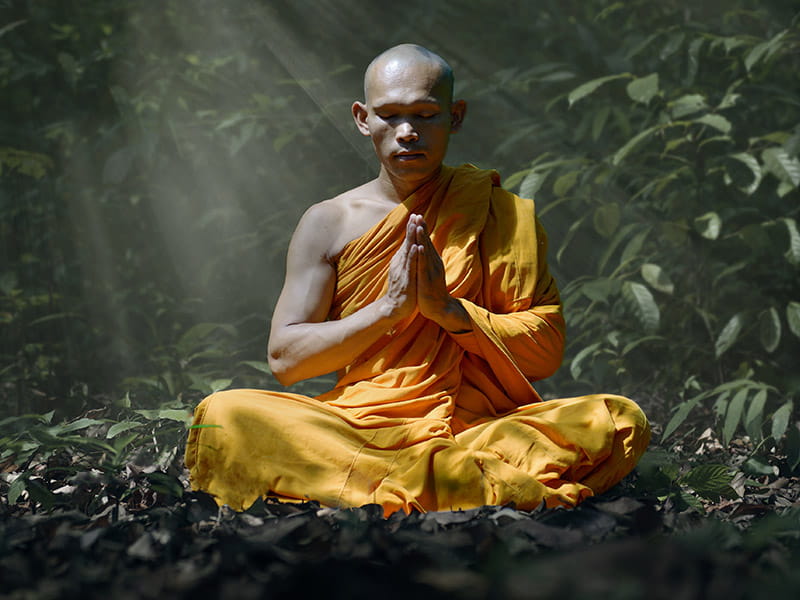Josh Baran, a former Zen priest, contributes to Tricycle magazine and manages media relations for His Holiness the Dalai Lama's visits to the Eastern United States. What follows is a dialogue between the author and his friends about the spiritual search and the nature of enlightenment.
My friend spent years in an Indian ashram and seemed to get a lot out of it. I keep thinking that I should go there.
Josh: Our minds frequently think about other people, places, and times. It can be very useful to take note of this. At this moment, what does your friend's life have to do with your's? When you picture him in India, what images arise in your mind?
[laughing] Well, I visualize him meditating in an exotic garden, surrounded by peacocks, and receiving secret teachings from an enlightened guru who glows in the dark.
Josh: That's a great image. Would you agree that these images are taking place entirely in your mind? You are the writer-director and you've cast your friend as the star of this fictional movie you've created. And it's not a documentary. When you watch this movie, what are your thoughts?
I think that if I don't go to India, I will miss out.
Notice the underlying feeling of "missing out." Most people can relate to this theme: it is an old story. Are there other times in your life when you feel you are missing something, yearning to be elsewhere, or doing something different or better?
Yes. I probably have these thoughts many times per day.
Josh: I think of these recurring stories -- "I'm missing out," "I'm not good enough," and "This shouldn't be happening" -- as the natural Zen koans of daily life. These koans pop up many times a day in a variety of costumes. You don't need to find a Zen Master to give them to you.
Looking at my stories doesn't seem very spiritual. Shouldn't I be having some kind of mystical experience?
Josh: Actually, this is as spiritual as it gets. Reality as it is -- in this moment, all right here. We don't need to seek something else, something more, some other experience, world, or reality. This is the great, open secret. It can be revolutionary to welcome life with open arms in each instant.
Are you suggesting that there's a "sudden" or "shortcut" approach to enlightenment, as opposed to a slow gradual process?
So, it doesn't take years of practice to be able to realize this?
Josh: Seeking takes time but seeing doesn't. Yes, you can seek for decades or you can see in this instant. Why wait?
So all I need to do is lead my regular life, content and happy just being myself, without meditating or practicing anything?
Josh: We don't need some holy or special life other than the one we are living. Our everyday life is perfect and sufficient. This moment now is sufficient. You mentioned simply being yourself. Here are some interesting questions to chew on: "Who are you?" "What is this 'self' that you are?"
Are you against spiritual practice?
Josh: No. The distinction I'm making is in the way in which spiritual practices are carried out. If a certain method assists you in seeing clearly, this is wonderful! However, certain underlying or unquestioned assumptions you might have while engaging in spiritual practices can make it virtually impossible to be simply present. My own experience is that truth is not found in any particular practice or tradition as if it were some thing. Great teachings and teachers only point to our own essence, independent of any practice you might decide to take up.
I can't imagine not planning for the future.
We can only ever live in this moment. On a practical level, of course, we all make plans for days, months, and years ahead. That is reasonable, but what happens is that our minds can get locked into a constant state of future focus. The reality is that we can't know or control the future. When we are attentive to the present moment, our life becomes rich and full and we do not worry about tomorrow, any more than do the lilies in the field. What I am addressing here is the way mind operates, so you can see for yourself how to be free and at home in your life.
I want to improve the world for my children and change my life for the better. If I live fully in the present, won't I become passive?
Josh: Not at all. Let's imagine that suddenly there was a fire in this building. Instantly, you spontaneously leap up, move quickly, help people get away from the flames, maybe even do something courageous. Your body-mind reacts in thousands of way that don't require thinking. In fact, it has an intelligence that is beyond what you can consciously know. Becoming consumed with thoughts like "This shouldn't be happening" or "Why me?" can significantly impair your response.
When you are present to life as it is showing up now, you are intimately engaged with the people and world around you. There is no gap. This is the opposite of passivity. You are available and actively contributing in ways you may not even realize yet.
So, I'd like to ask again: Is there anything I can do to practice this?
Josh: There's nothing to practice or achieve and nowhere you need to go. This is all about awareness in this moment. It's really that simple. No philosophy, religion, or conceptualization required. Direct recognition is the key. Then each and every moment becomes meditation: unadorned wakefulness. Nirvana here and now.

